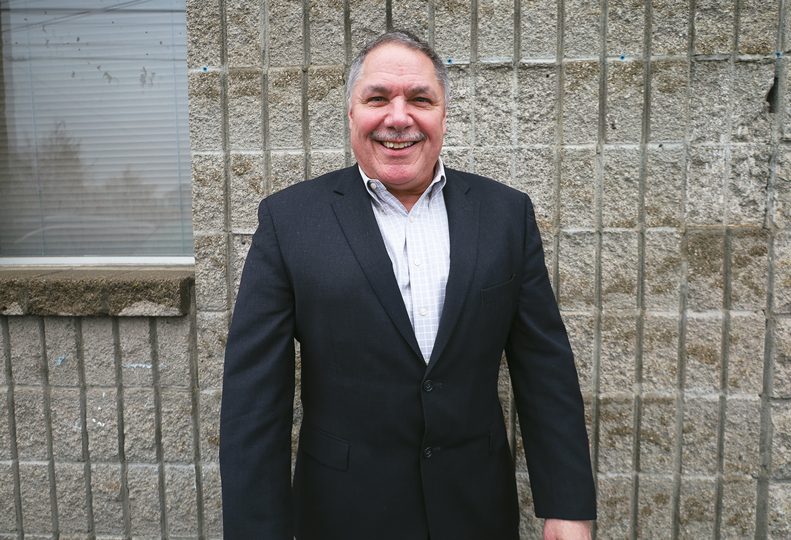
Home » Parting Thoughts: Alan Lesher, president and CEO of YMCA of the Inland Northwest
Parting Thoughts: Alan Lesher, president and CEO of YMCA of the Inland Northwest

February 13, 2025
Alan Lesher, president and CEO of YMCA of the Inland Northwest, will retire at the end of the month after 16 years leading the nonprofit organization.
Lesher, 61, is a born-and-raised Spokanite who attended North Central High School, followed by Spokane Falls Community College, and graduated from Eastern Washington University with a degree in accounting.
He started his career with the Spokane office of BDO Seidman LLP, a national accounting firm. After three years, he went to work for one of his clients, Spokane Flower Growers Inc., which imported flowers from around the world and worked in five states. After 18 years in the floral industry, Lesher took a year hiatus, then decided he wanted to work in the nonprofit world. He started in an interim financial role with YMCA of the Inland Northwest, then rose to the role of chief financial officer. In January of 2021, Lesher became the nonprofit’s president and CEO.
During his tenure, Lesher was involved in developing the Central, North, and South Spokane YMCAs, as well as the Litehouse YMCA in Sandpoint, Idaho.
Most recently, under his guidance, the YMCA secured 18 acres of land to develop the Glenrose YMCA on the South Hill and has led community engagement efforts surrounding the project.
The Journal recently sat down with Lesher to discuss his career path, his advice to others, and his plans for retirement.
What made you want to switch careers and go into the nonprofit world?
I didn’t know anything about the nonprofit world. At the time, it was just an epiphany. I was spending my break at a little fishing cabin on the Pend Oreille River and wondering what I could do. I had been working in the for-profit space, which has a lot of quotas and pay structures. I thought I could transfer those skills to nonprofits.
During my interview with the CEO at the time, Rig Riggins, I said, "I need to tell you I know nothing about nonprofits. I don’t want you to be surprised later." He said, “Well you’ve opened new branches and been involved in acquiring other businesses and expanding operations, and other things. We need that knowledge for the things we are going to be doing. You can learn the nonprofit stuff, can’t you?”
That’s why I call it a God thing. I feel I was just meant to be here. At the time, they were involved in the New Markets Tax Credit Program, which was very complicated. There wasn’t a lot of expertise in the community to do that; it was about a $6 million benefit to our project using that financing vehicle. One of the first things I did was learn how to navigate that process.
In the 16 years you’ve been with the Y, what are you most proud to have achieved?
I feel like this career has been the most rewarding. We’ve expanded our footprint and our programs. We’ve acquired buildings and fitness clubs. But the other thing we’ve done as well is, because of our leadership development programs through the YMCA of the USA, we’ve trained a lot of leaders that either stay at the Y or they have new skills that they take somewhere else.
The other thing I’m super proud of is all the kids we train, whether it's lifeguards, member service reps, or camp counselors. They come to our organization, and a lot of times, it’s their first job. They’ve developed a set of skills that makes them responsible individuals. They tend to do well, and I’m really proud that they got their start here.
Why have you decided to retire now?
I always start the story by saying it has a good ending. I had planned to retire after I finished the Glenrose project, but what happened is, a little over two years ago, my wife, Sue, got a very aggressive form of kidney cancer. She had surgery and a revolutionary new immunotherapy treatment. She’s doing much better now. But I call it our second chance tour. I said, “Hey maybe now is a good time to do all those things we planned to do in five years.”
We’re going to spend some time with the grandkids, travel, and look into building a little lake house that I’ve been talking about for years. We’ve got plenty of stuff planned.
Any last thoughts?
This community is really fortunate to have the YMCA here. We’re not just a rec center; we’re so many different things. As an organization, the Y tends to be a little too humble at times. We’re not out telling people about all the different things we do.
It’s been an honor and a privilege to serve this community. Spokane is a very generous and caring community, and that’s what makes it such a special place to live.
Latest News Instagram
Related Articles
Related Products




![Brad head shot[1] web](https://www.spokanejournal.com/ext/resources/2025/03/10/thumb/Brad-Head-Shot[1]_web.jpg?1741642753)
